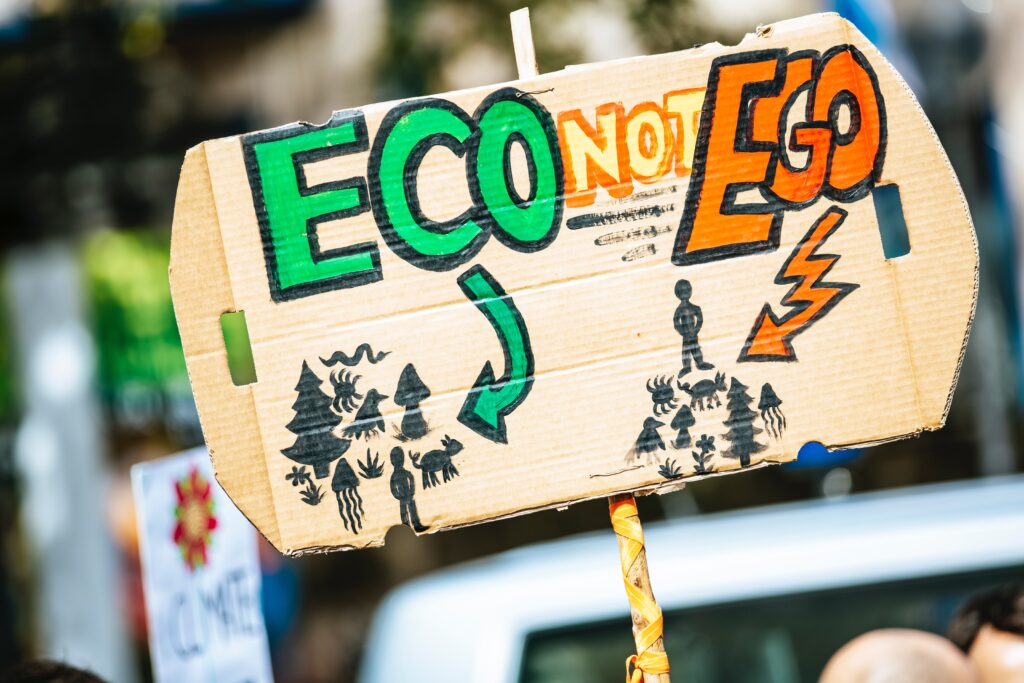
Could moving past growth protect the planet?
In May this year, thousands of people gathered in the European Parliament to discuss the idea that it is only possible to truly address planetary-wide environmental and social breakdown if we change the very heart of our global economic system: the pursuit of growth. Speaking at the European Beyond Growth conference, Tim Jackson, Author of ‘Prosperity without Growth’ said “we need an economy whose guiding principle is care”.
What is degrowth?
The degrowth movement, as it is sometimes known, advocates for a planned and democratic reduction of the economies of rich countries. It’s about creating smaller, more sustainable systems. Rather than our economic goal being the relentless pursuit of profit at all costs – which only benefits those at the very top – an economy should serve the needs of people. Some activities, like fossil fuel production, meat and flights, will have to be rapidly reduced. Some sectors, including renewables, public transport and education will be developed until they fulfil the needs of their societies.
Degrowth is often criticised in the media because it is characterised by its opponents as introducing a voluntary, permanent recession. Recessions are a nightmarish but inevitable part of the boom and bust cycle of growth-based economies that create widespread hardship and suffering. Degrowth, on the other hand, means down-scaling in an organised way, in order to avoid such harms to ordinary people.
There is space for fair and sustainable businesses in a degrowth future. Rather than an exhausting cycle of profit driven growth, businesses would be run to provide a service to people and communities, without damaging nature.

Is degrowth necessary?
In 2021, academic experts published a study in the scientific journal Nature which showed that to reduce emissions in line with the Paris Agreement targets, rich nations must reduce greenhouse gas emissions by 12% a year. They found that there was no way to do this if the countries continued to pursue economic growth. Even with zero growth, this level of emissions reduction was impossible. They concluded that a liveable future requires new economic strategies.
To put this another way, imagine that the world many of us want to see was somehow realised – clean energy for everyone, all the products on our shelves are recyclable and recycled, pollution disappeared. Even if we achieved all this, if it was done in a system still based on economic growth, we would end up in ecological collapse because endless growth on a finite planet is impossible. We mustn’t stop calling for the changes that are vital to a better future but, if we want lasting change, we must change our economy too.
What changes to our economy would support this shift?
Turning our juggernaut of an economy round is a daunting task, but it is possible. What is required is a systematic and integrated plan, implementing changes at every level of society, from the way we use products, to our public services, jobs and monetary systems.
Examples of degrowth policies
- Products: Reduce unnecessary production, end planned obsolescence, cut advertising, shift from ownership to usership, end food waste
- Lifestyles: Improve public services, decommodify basic goods (like housing, health and eduction), Universal Basic Income
- Jobs: Introduce a green jobs guarantee, raise wages, reduce working time (4-day week)
- Equality: Shift from debt to equity finance, maximum wage policy, reduce irresponsible lending, cancel most debt
Each one of these policies would be an improvement on the current system. For example, ending planned obsolescence, the widespread practice of deliberately reducing the lifespans and repairability of products to increase sales, would save people money and reduce consumption.
Some policies will mean big transformations and require development to happen in a certain order: improving public services and ensuring basic income for everyone must happen before widespread reductions in working time can be fully embraced. This means governments must have a clear, long-term over-arching strategy for degrowth which comprehensively changes the whole economic system over several decades.
As the limits to growth are becoming more apparent, through the loss of biodiversity, extreme weather events caused by climate breakdown and the toxic chemicals embedded in products by corporations that make them easier to sell but which also slowly poison us, more people are questioning the growth-based model.
Degrowth offers an alternative future, one where everyone’s needs are met so we have more time to spend doing what we love with who we love. This is the caring vision that Tim Jackson spoke about in Brussels – a future where we have more time to care for ourselves, for others and the natural systems that we are part of.
Degrowth is a vision of fair and sustainable future which is within our grasp.
